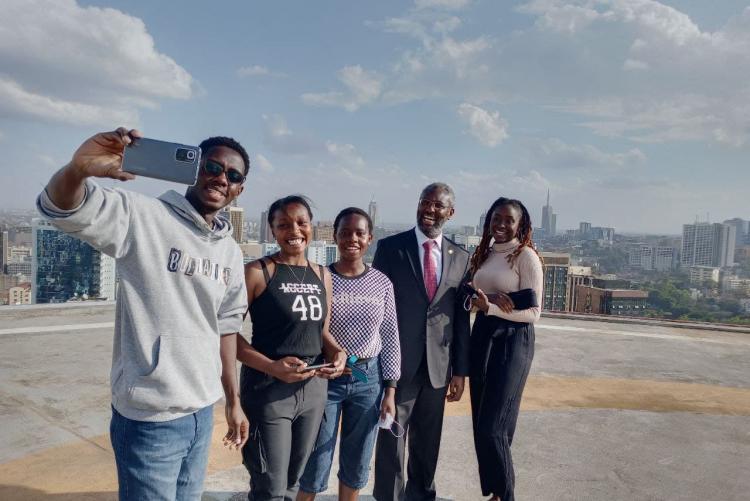The Department of Journalism and Mass Communication students have been actively engaged in writing scripts for both the audio and visual content, shooting, editing and production of the content. UNESCO took them through a series of trainings to ensure that they are fully equipped. They collaborate with their lecturers and come up with a podcast, where they disseminate the fullness of the project in its nitty gritty form- their rights, lives and future. By the end of 13 weeks, the students are expected to have produced and published 65 episodes of the podcast.
The students are involved in designing, creating and developing messages in line with the O3PLUS objectives. The whole production process; from planning, coming up with approved content, production and post production is student based. The production process is hands on as the students use their theoretical knowledge learned from class and apply it in the project.
Every week, the podcast has a theme that it focuses on. Currently, they are dealing with ‘Our Rights’ part of the project and they are producing content that educates the students; on their rights, issues that can derail the said rights and how they can enjoy them. The podcast also aligns itself with global events and campaigns that are in tandem with their theme. For example, over the last week, there has been a campaign by the United Nations Women- 16 Days of Activism.
In addition to the podcast, the students from the DOJMC are responsible for audio visual content, published on the University of Nairobi YouTube page after production. The students with the supervision and guidance of their lecturers produce these videos. They do so every week and with a theme on its own but always in agreement with the project’s objectives.
Further, there is the O3 plus Drama club, which comes up with theatrics, skits and dramas. The students do not outsource any talent but rather, they make use of their own in-house talents and gifts. The students now begin their sixth week of production. This means that they have already published 25 podcast episodes and 5 YouTube videos.
The project has helped the students to warmly engage with their lecturers and develop their teamwork abilities through working and meeting project deadlines together. They have learnt to edit, script write and use several software. ‘At the beginning of this project I was not able to edit and perform any tasks post production but thanks to the project and our mentor lecturers, I have been able to learn and perfect those skills and I am proud to say that I am now proficient,’ Kairu Karega a student participating in the project says.
It is impressive how the broadcast production, journalism and mass communication students have a new found respect for their rights after much engagement with the students through the school’s administrative. As they interview their fellow students and network, they get to find out about their fellow’s experiences be it good or bad. Through this, they have appreciated the gap the project is filling and they hope that they will get traction and share their experiences and knowledge with the rest of the students.
Our Rights, Our Lives, Our Future is an initiative of UNESCO in partnership with the University of Nairobi and Mt. Kenya University to aid students in all aspects of their campus lives. This project aims to help the students on campus to understand their rights, to ensure that they guard their mental health and their overall wellbeing.
The students appreciate the school for supporting them and offering them with this kind of opportunity to work and use the school’s resources including the cameras, the radio station, which they use to record the podcast, and the shoot locations around the school to practically nurture their skills.

